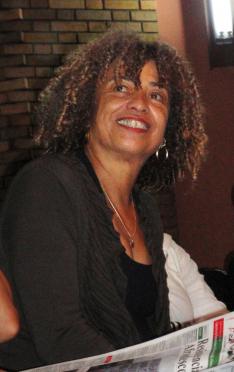
The role of women in efforts to counter gender violence during the mid-20th century has been historically undervalued, said activist and educator Angela Davis during a March 31 lecture that filled McCosh 50. As an example, Davis cited Rosa Parks, who is best known for her activism related to civil rights. Before her role in the Montgomery Bus Boycott, Parks had been an anti-rape activist for more than a decade but was not recognized for those efforts for many years, Davis said.
Davis, professor emerita at UC, Santa Cruz, was the keynote speaker at a conference on “Gender, Violence, and Anti-Violence.” She addressed incarceration rates in the United States, especially for men of color, and said the number of women in American prisons (200,000, which she said is one-third of the world’s female prison population) is an issue that should be taken as seriously as the rate of imprisonment for men.
“We can’t underestimate the damage that these institutions have done to black men and men of color,” Davis said. “But why do we assume that because women constitute a much smaller number of people in prisons, that the problem is therefore small?”
Davis said she believes that “anti-immigrant racism, violent anti-Muslim racism, and unabashed Islamophobia” that followed the 9/11 terror attacks have contributed to much of the activism by young people today.
“Even the president of the United States [has endured] Islamophobic speculations about his birth and religious affiliation,” she said. “We’ve witnessed the justification of torture, and of state terror. … Seems to me that it’s not accidental that young people began to speak out against white supremacy and racism.”
Asked about her thoughts on the Black Lives Matter protests, Davis said young people should feel grateful to be starting their lives during an era with “so much promise.”
“I’m excited, because it seems that there are so many ideas that have remained marginalized for such a long time that are finally being taken up,” she said.